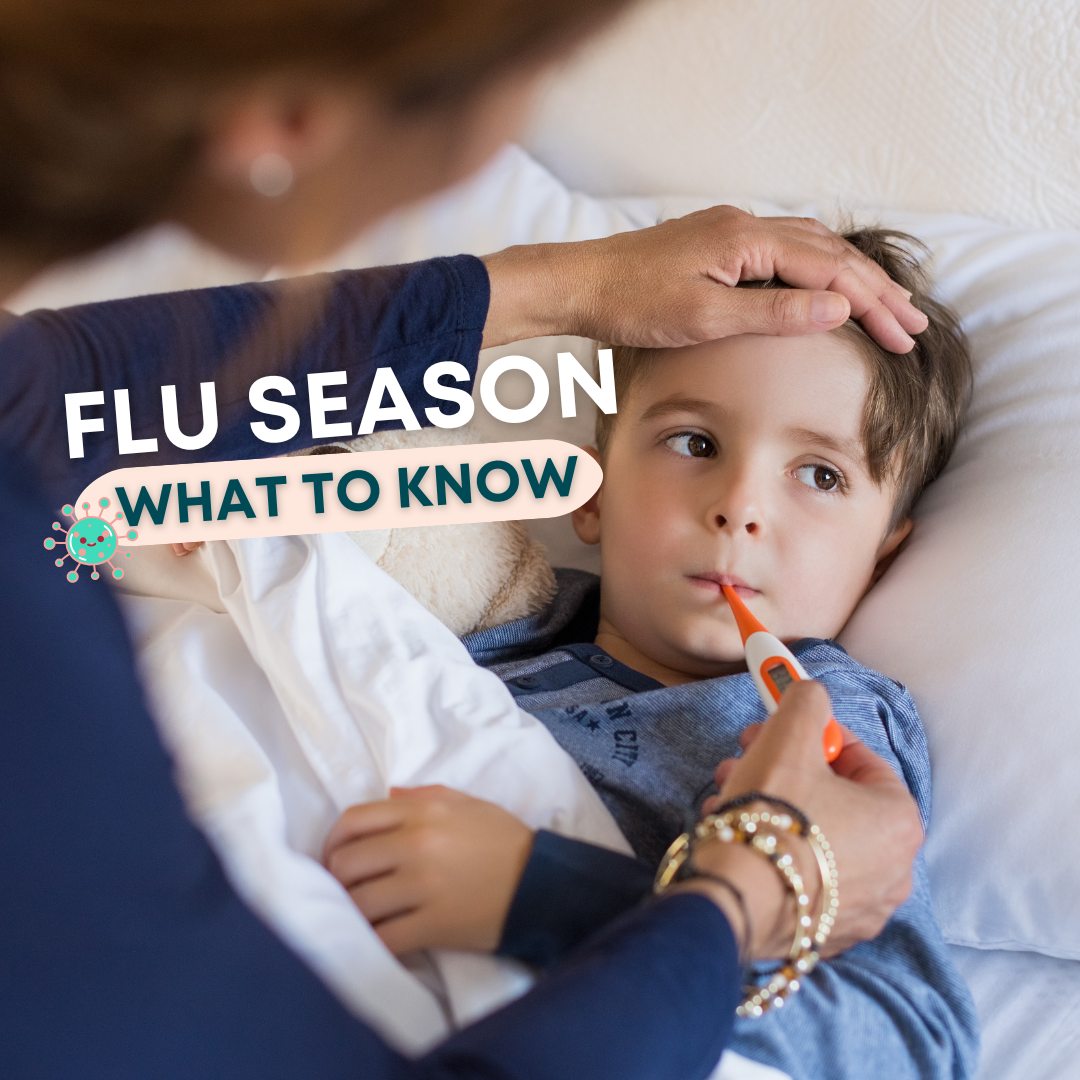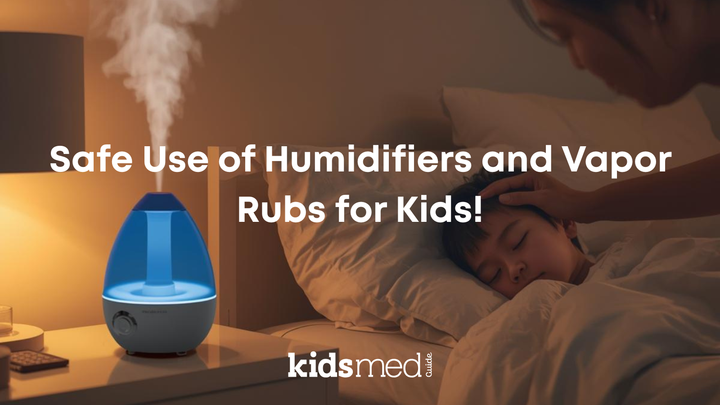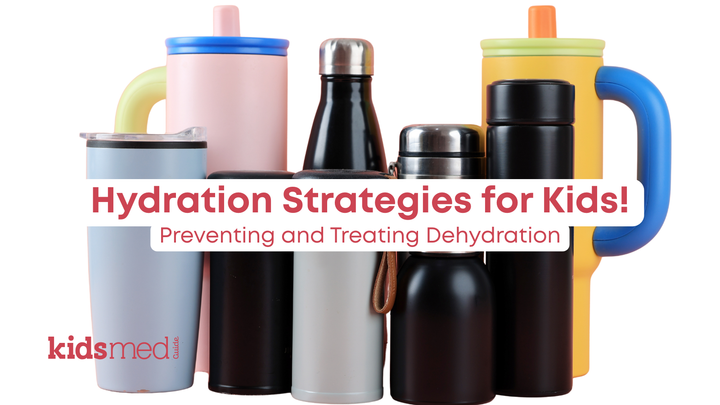Treating Flu in Kids: A Pharmacist Explains

In the United States, December- February represents the peak influenza season. This year is no exception.
Data collected from the CDC's respiratory illness surveillance programs indicate that flu activity is elevated throughout most of the country and is expected to remain high for several weeks.
P.S. It's not too late to get a flu shot for your kids if you haven't yet!
As a parent, I can also confirm that literally EVERYONE is sick right now. We've gotten notifications from school and daycare confirming flu cases in my kids' classrooms.
Many families we know have been ill with flu over the last few weeks, and a few of my kids' friends have even needed hospital or ER visits. I had it right after Christmas, but thankfully, no one else in my family caught it!
A flu shot is the best way to prevent serious illness, but it's not 100% effective. If your child has the flu, here are some tips on how to treat it and keep them comfortable, including explanations of prescription antiviral medicine.
What is the Flu, and What are its Symptoms?
Flu is a respiratory viral illness that usually circulates in the colder winter months. Symptoms can be wide and varied, especially in children!
The most common symptoms include fever, chills, cough, body aches, and fatigue. Kids may also have GI side effects like nausea, vomiting, or diarrhea.
Fun nerd fact - in pharmacy school, when taking notes, I had to jot down "nausea, vomiting, or diarrhea" SO MANY times that I started short-handing it NVD, and I still say it like that in my head and sometimes accidentally to patients.
The body aches and fatigue associated with an influenza infection can be severe, which is usually a sign that you're dealing with flu rather than another common cold.
Unlike colds or RSV, flu symptoms typically occur suddenly and intensely.
Most children can be managed at home and recover well with rest. However, some may become seriously ill from the flu and need hospitalization or develop secondary infections such as pneumonia, ear infections, or other complications.
If your child's illness concerns you in any way, reach out to your pediatrician or medical center for assessment.
Who is at High Risk From the Flu?
Anyone, even perfectly healthy young adults, can get very sick from the flu. However, certain groups are more likely to experience severe flu infections or complications.
In children, high-risk groups include:
- Children under age 5, especially under age 2
- Those with underlying medical conditions like heart, lung, or kidney disease
- Children with cancer or on immunosuppressants
- Those with diabetes or certain types of nervous system disorders
In your family, also be aware that high-risk groups include:
- Pregnant individuals
- Elderly family members
- Anyone with chronic health conditions affecting the heart, lungs, or kidneys
How is Flu Treated?
Treating flu is mainly just treating the symptoms, preventing dehydration, and helping your child stay comfortable.
Rest is very important for recovering from a flu infection. The words "rest" and "child" are rarely used together, but do your best to encourage quiet activities and plenty of sleep!
Flu treatment options consist of non-drug remedies, over-the-counter medications, and, in some cases, prescription antiviral medications:
Non-drug and natural remedies
Honey (Important: only for age 1 year or older!):
- Soothes sore throat and reduces coughing, especially at night
- Give 1/2 - 1 teaspoon (2.5-5 mL) as needed, or mix into warm water or tea
Fluids:
- Prevents dehydration, can help soothe a sore throat, can help break up congestion and thin mucus
- Offer frequent fluids to your children; options include water, half-strength apple juice, soup broth, or a decaffeinated tea
- If you are concerned your child is becoming dehydrated, give an oral rehydration solution like Pedialyte®
Cool mist humidifier:
- Run at night while your child is sleeping or continuously
- Eases congestion and cough
- Calms irritated nasal passages and throats
- Follow package instructions, typically use distilled or purified water and clean it often
Nasal saline:
- Helps with irritated nasal passages
- Thins mucus and breaks up congestion, helping with stuffy noses and coughs
- Apply a few drops to the nose and follow with tissues or nasal suction via a bulb syringe or Nose Frida® as needed
Over-the-counter pain and fever relievers
Acetaminophen and ibuprofen:
- Reduces fever, reduces pain and discomfort, helps to alleviate the chills or sweats
- Call your doctor for any fever in an infant under 3 months of age
- Ibuprofen is for ages 6 months and older
- Follow the weight-based dosing recommendations on your package
- Can alternate acetaminophen and ibuprofen for stubborn fevers and pain (patients must be 6 months or older to take ibuprofen)
Important: do NOT use aspirin in children
- Never give aspirin or an aspirin-containing product (like Pepto Bismol® or a combination cold medicine product) to kids
- Using aspirin in children with influenza can cause Reye syndrome, a very dangerous condition in pediatrics
- Aspirin is generally not indicated in children under any circumstances unless prescribed by a doctor for a specific medical condition
Antiviral treatment for kids
Antiviral treatment includes prescriptions written by a doctor to help the body fight the influenza virus.
Antivirals do not cure patients, but they reduce the severity and duration of illness and may help prevent secondary diseases like ear infections.
According to the CDC and Infectious Disease Society of America (and in agreement with the American Academy of Pediatrics), parents and healthcare providers should consider antiviral medication for children diagnosed with the flu, especially those who may be high risk, such as:
- Children under age 5, especially children under age 2
- Children with an underlying health problem such as heart or lung disease, kidney disease, diabetes, asthma, or cancer
- Children who have pregnant family members or babies under 6 months of age in the home
- Any patients with severe symptoms or whose symptoms are rapidly worsening
- Any patients who are hospitalized from the fu
Antiviral medications approved for treating flu:
- Oseltamivir phosphate (Tamiflu®) liquid or capsule
- Zanamivir (Relenza®) inhalation
- Peramivir (Rapivab®) intravenous injection
- Baloxavir marboxil (Xofluza®) tablet or granules
We'll dive more into oseltamivir (Tamiflu®), the most well-known and most commonly prescribed antiviral flu medication. First, a few quick notes about the other options:
- Zanamivir is given via an inhaler. It's for patients aged 7 years and older and shouldn't be used in patients with asthma.
- Peramivir is only used in the hospital setting.
- Baloxavir is approved for patients aged 12 years and older and only for outpatients.
Oseltamivir (Tamiflu®)
Oseltamivir (Tamiflu®) is commonly prescribed and is the drug of choice in pediatrics. It comes in liquid or capsule form and can be given to young babies and pregnant individuals.
Tamiflu® is used to treat influenza infections in children and adults. It's most effective if started within 48 hours of symptom onset. Tamiflu® can also prevent influenza (called prophylaxis treatment) in a high-risk individual exposed to the flu.
Tamiflu® dose, side effects, and important points:
- The dose is based on your child's weight until they reach 13 years of age or 40 kg, at which point they receive the adult dose of 75 mg.
- It's given twice a day to treat the flu and once daily to prevent it.
- It's available as an oral suspension. Shake it well and use the measuring device provided by the pharmacy.
- The liquid suspension can be stored at room temperature for 10 days or in the refrigerator for 17 days.
- The most common side effect is nausea or vomiting; give with food to lessen GI side effects.
- Rarely, Tamiflu® can cause an allergic reaction or a severe skin rash; contact your doctor or seek emergency help immediately if you notice a rash or signs of an allergic reaction.
- Post-marketing data indicate that Tamiflu® may rarely cause neuropsychiatric effects in children, like abnormal behavior, hallucinations, or delirium.
- The FDA has been unable to prove or quantify this side effect, but case reports exist, and the prescribing information includes a warning.
- Note that flu can also cause neuropsychiatric effects.
- This potential adverse effect is understandably concerning to parents; if you are concerned, speak with your child's pediatrician for guidance on weighing the risks versus benefits.
If you suspect your child has the flu, we recommend contacting their pediatrician, especially if their illness is moderate to severe or if your child or someone in your household is at high risk, as described above.
Antiviral medications like Tamiflu® have been proven to help. Still, they come with significant side effects that parents should be aware of.
Speak with your pediatrician and decide together if a course of antiviral medication is appropriate for your child.
Remember, a flu shot is still your child's best protection against flu, and antiviral medications should not replace an annual flu shot.
When to Call the Doctor
Influenza is a funny thing, and it can be scary. Some kids only get mildly ill, and others get their butts kicked. This flu season, '24-25, has been pretty bad.
Call your doctor if your child is very sick and you suspect they could have the flu. They can help you evaluate whether your child should be tested and whether a course of antiviral medication is warranted.
Antiviral medications like Tamiflu® are most effective if started within the first 48 hours of illness, so if your child is high risk or is very sick, be sure to call your doctor or get your child seen early in the illness course.
Knowing if your child has the flu can be tricky. Still, a sudden onset with severe symptoms is usually a good indicator.
Emergency warning signs that warrant immediate medical attention include:
- Extreme lethargy, unable to be aroused
- Dehydration (lack of tears, dry mouth, sunken soft spot in babies, sunken eyes, lack of urination or wet diapers, etc.)
- Unable to drink fluids, babies unable to nurse or take bottles
- Difficulty breathing or rapid breathing
- Fast, weak pulses or dizziness
- Fever above 104°F (40°C) or any fever in infants under 12 weeks
- Experiences worsening symptoms after initial improvement
There's a saying in medicine that healthcare providers use when evaluating illness severity: "sick or not sick." This saying holds for parents, too!
Trust your intuition. Some kiddos with the flu do fine like it's any other illness. Other kids get really sick. If your child looks sick or something seems wrong, call your pediatrician or head to your urgent care/emergency room.
If your child has a mild-moderate illness and doesn't need medical attention or antiviral medicine, you can support them with good home care. Encourage lots of rest and fluids, and expect to ride out the virus for several days. Flu can take a while to kick!
Stay well!
The following references were used to compile this information:
CDC. (2024, September 30). Treatment of Flu in Children. Influenza (Flu). https://www.cdc.gov/flu/treatment/children-antiviral.html
CDC. (2025a, January 10). People at Increased Risk for Flu Complications. Influenza (Flu). https://www.cdc.gov/flu/highrisk/index.htm
CDC. (2025b, January 17). Weekly US Influenza Surveillance Report: Key Updates for Week 2, ending January 11, 2025. FluView. https://www.cdc.gov/fluview/surveillance/2025-week-02.html
COMMITTEE ON INFECTIOUS DISEASES. (2023). Recommendations for Prevention and Control of Influenza in Children, 2023–2024. Pediatrics, 152(4), e2023063773. https://doi.org/10.1542/peds.2023-063773
Pavia</p>, <p>Timothy M. U., Henry H. Bernstein, John S. Bradley, Janet A. Englund, Thomas M. File Jr, Alicia M. Fry, Stefan Gravenstein, Frederick G. Hayden, Scott A. Harper, Jon Mark Hirshon, Michael G. Ison, B. Lynn Johnston, Shandra L. Knight, Allison McGeer, Laura E. Riley, Cameron R. Wolfe, Paul E. Alexander, and Andrew T. (n.d.). Influenza. Retrieved January 21, 2025, from https://www.idsociety.org/practice-guideline/influenza/
TAMIFLU® (Oseltamivir Phosphate).
The Flu: What Parents Need to Know. (2021, October 4). HealthyChildren.Org. https://www.healthychildren.org/English/health-issues/conditions/flu/Pages/the-flu-what-parents-need-to-know.aspx



